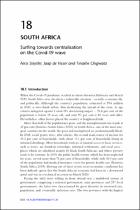| dc.description.abstract | When the Covid-19 pandemic reached its shores between February and March
2020, South Africa was already in a vulnerable situation – socially, economically,
and politically. Although the country’s population, estimated at 59.6 million
in 2020, is two-thirds urban, thus facilitating the spread of the virus, its age
cohorts mitigated against Covid-19’s devastating impact – 28.6 per cent of the
population is below 15 years old, and only 9.1 per cent is 60 years and older.
Nevertheless, other factors placed the country at heightened risk.
More than half of the population is poor, and the unemployment rate stands at
42 per cent (Statistics South Africa 2020); in South Africa, one of the most unequal countries in the world, the poor and unemployed are predominantly black.
In 2018, social grants were, after salaries, the second main source of income for
45.2 per cent of households, with about 13.1 per cent of households living in
informal dwellings. | en_US |

